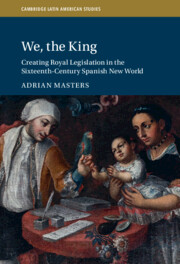Book contents
- We, the King
- Cambridge Latin American Studies
- We, the King
- Copyright page
- Dedication
- Contents
- Figures
- Tables
- Acknowledgments
- Prelude: A Peruvian Mestizo at the Spanish Court
- Introduction
- 1 Paper Ceremonies for a Global Empire
- 2 The Cocreation of the Imperial Logistics Network
- 3 Distant Kings, Powerful Women, Prudent Ministers
- 4 Lawmaking in a Portable Council
- 5 “Bring the Papers”
- 6 Creating the Royal Decree
- Pedro Rengifo’s Epilogue
- Conclusions
- Glossary
- Bibliography
- Index
- Other Books in the Series (continued from page ii)
4 - Lawmaking in a Portable Council
Gobierno Decision-Making Technologies Before 1561
Published online by Cambridge University Press: 02 March 2023
- We, the King
- Cambridge Latin American Studies
- We, the King
- Copyright page
- Dedication
- Contents
- Figures
- Tables
- Acknowledgments
- Prelude: A Peruvian Mestizo at the Spanish Court
- Introduction
- 1 Paper Ceremonies for a Global Empire
- 2 The Cocreation of the Imperial Logistics Network
- 3 Distant Kings, Powerful Women, Prudent Ministers
- 4 Lawmaking in a Portable Council
- 5 “Bring the Papers”
- 6 Creating the Royal Decree
- Pedro Rengifo’s Epilogue
- Conclusions
- Glossary
- Bibliography
- Index
- Other Books in the Series (continued from page ii)
Summary
For decades, two sophisticated historiographies, postcolonialism and critical archival studies emphasized that knowledge is power and that archives are power. These two formulas have been subject to recent criticism from a small group of renowned researchers, who stress that knowledge and archives do not possess such a linear and direct relationship with domination. It remains for us, therefore, to explore how, and in which specific social contexts, knowledge and archives allow administrations to achieve more power. This chapter follows the Council of the Indies during its nomadic existence, from 1524 to 1561, in which ministers prioritized communication with vassals (along with a subsequent incoherence of imperial policies) over an assertive, coherent program. This chapter also explores the decision-making technologies of this nomadic council, especially how it applied limited textual hermeneutics to petitions. It also follows the extraordinary juntas: committees which occasionally convened to solve imperial crises and which applied more sophisticated knowledge-based decisions to Indies problems. Nonetheless, I argue, the Council’s members recognized the inefficacy of its theological approaches and its largely nonarchival hermeneutics, setting the stage for reform.
- Type
- Chapter
- Information
- We, the KingCreating Royal Legislation in the Sixteenth-Century Spanish New World, pp. 155 - 179Publisher: Cambridge University PressPrint publication year: 2023



